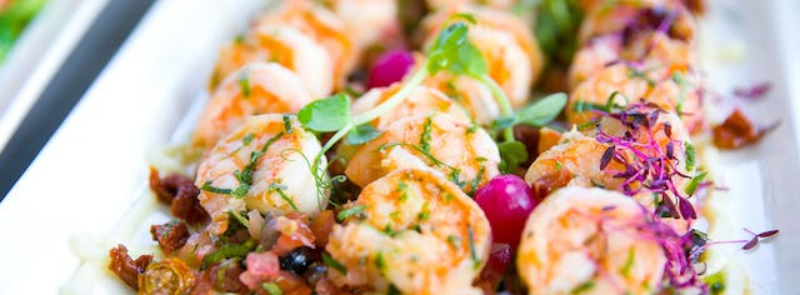
When It Occurs
Every May 10th
Timeline
Days Passed (1023)
# Hashtags
#NationalShrimpDay #RelishSeafood
While salmon holds the title of America's favorite fish, shrimp claims the crown as the favorite seafood. Given the substantial fondness for shrimp consumption, it's no wonder someone felt compelled to establish National Shrimp Day. Celebrated annually on May 10th, this holiday provides an additional excuse for Americans to indulge in even more shrimp than they already enjoy.
History and Background
The National Shrimp Day likely emerged from a growing national love for shrimp, driven by the seafood industry and coastal communities. Shrimp has long been a staple in American diets, especially in the southern and coastal regions where it's harvested in abundance.
- The Gulf of Mexico and the Atlantic coast are the primary sources of wild-caught shrimp in the U.S.
- Louisiana, Texas, and Florida are major shrimping states.
- In recent years, farm-raised shrimp has also become a significant part of the seafood market, with shrimp farms both in the U.S. and abroad contributing to the supply.
Popularity of Shrimp in the United States
Shrimp is the most consumed seafood in the U.S., with Americans eating over 1.5 billion pounds of shrimp annually. This high consumption rate is attributed to shrimp's versatility and relatively mild flavor, making it suitable for various cooking methods and recipes.
- Shrimp is commonly served in dishes such as shrimp cocktail, shrimp scampi, shrimp gumbo, and fried shrimp.
- Pop culture references like the famous "Bubba Gump" scene from the movie Forrest Gump have also added to shrimp's widespread recognition and appeal.
Ways to Celebrate National Shrimp Day
On National Shrimp Day, seafood lovers celebrate by preparing and enjoying shrimp dishes. Restaurants, especially seafood establishments, may offer special promotions or highlight shrimp dishes on their menus. Here are some common ways to observe the day:
- Cook Shrimp at Home: Many people use the day as an opportunity to try new shrimp recipes or cook their favorite shrimp dishes at home. Shrimp can be grilled, sautéed, baked, boiled, or fried, offering endless culinary possibilities.
- Dine at a Seafood Restaurant: Seafood restaurants often participate in National Shrimp Day by offering special deals on shrimp dishes or creating unique shrimp-based offerings.
- Attend a Shrimp Festival: While shrimp festivals are not specific to National Shrimp Day, many coastal towns and cities hold shrimp festivals that coincide with the shrimping season. These events often feature shrimp tasting, cooking contests, and live entertainment.
- Learn About Shrimp: For those who want to go beyond eating shrimp, National Shrimp Day can also be an educational opportunity. Learning about sustainable shrimp fishing practices, different shrimp species, and the economic importance of shrimp to coastal communities can be a rewarding way to engage with the day.
Shrimp Varieties and Dishes
There are several varieties of shrimp consumed in the United States, and they can be prepared in numerous ways:
- White Shrimp: Known for their mild flavor and firm texture, white shrimp are commonly used in dishes like shrimp scampi or shrimp tacos.
- Brown Shrimp: These shrimp have a stronger, more pronounced flavor, making them ideal for bold dishes such as shrimp gumbo or cajun shrimp.
- Pink Shrimp: Often harvested from the Gulf of Mexico and the South Atlantic, pink shrimp have a delicate flavor and are frequently used in shrimp cocktails or light pasta dishes.
Popular shrimp dishes include:
- Shrimp Cocktail: Chilled shrimp served with cocktail sauce, typically as an appetizer.
- Shrimp Scampi: A classic Italian-American dish featuring shrimp sautéed in garlic, butter, and white wine, often served over pasta.
- Cajun Shrimp: Shrimp seasoned with Cajun spices and served with rice or in a po' boy sandwich.
- Shrimp Gumbo: A traditional Southern dish with shrimp, okra, and a dark roux, typically served with rice.
- Fried Shrimp: Shrimp that is battered or breaded and fried, often served with tartar sauce or cocktail sauce.
Shrimp's Nutritional Value
Shrimp is not only delicious but also nutritious. It is a good source of:
- Protein: A 3-ounce serving of shrimp contains about 20 grams of protein.
- Low in Fat: Shrimp is naturally low in fat and contains very little saturated fat.
- Omega-3 Fatty Acids: These beneficial fats support heart health.
- Vitamins and Minerals: Shrimp is rich in nutrients like vitamin B12, selenium, and iodine.
Despite its nutritional benefits, shrimp is also high in cholesterol. A 3-ounce serving contains about 166 mg of cholesterol, which is something to be mindful of for those monitoring their cholesterol intake.
Sustainability and Shrimp Farming
With shrimp being such a popular seafood item, sustainability has become a significant concern. Overfishing, habitat destruction, and poor aquaculture practices have led to calls for more sustainable shrimp harvesting and farming methods.
- Wild-caught shrimp can sometimes contribute to the depletion of shrimp populations and damage to marine ecosystems through bycatch (the capture of unintended species).
- Shrimp farming has its own challenges, such as water pollution and habitat loss. However, sustainable shrimp farms that use environmentally responsible practices are becoming more prevalent.
Organizations like Monterey Bay Aquarium's Seafood Watch provide guidance on choosing sustainably sourced shrimp. They recommend looking for certifications like MSC (Marine Stewardship Council) for wild-caught shrimp and ASC (Aquaculture Stewardship Council) for farmed shrimp.
Conclusion
National Shrimp Day is a celebration of one of America's favorite seafoods, offering a chance to indulge in a variety of shrimp dishes and explore new recipes. Whether dining out or cooking at home, seafood lovers can appreciate shrimp’s versatility and the role it plays in U.S. cuisine. It's also an opportunity to learn about sustainable shrimp sourcing and support responsible fishing and farming practices.


